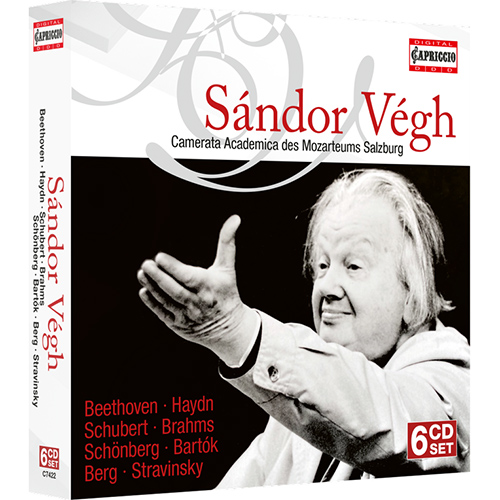Orchestral Music - BEETHOVEN, L. van / HAYDN, J. / SCHUBERT, F. (Camerata Salzburg, International Musicians Seminar Soloists, Végh) (6-CD Box Set)
- BEETHOVEN, L. van: String Quartet No. 14 / Grosse Fuge (arr. for strings) (International Musicians Seminar Soloists, Vegh) C10356
- HAYDN, J.: Sieben letzten Worte unseres Erlösers am Kreuze (Die) (The Seven Last Words) (version for string orchestra) (Camerata Salzburg, Vegh) C10465
- SCHUBERT, F.: Symphonies Nos. 5 and 6 (Camerata Salzburg, Vegh) C10535
- SCHUBERT, F.: Symphonies Nos. 8 and 9 (Camerata Salzburg, Vegh) C10503
- BRAHMS, J.: String Quintet No. 2 / SCHOENBERG A.: Verklarte Nacht (arr. for string orchestra) (Camerata Salzburg, Vegh) C71117
- BARTOK, B.: Divertimento / BERG, A.: 3 Pieces from the Lyric Suite / STRAVINSKY, I.: Apollon musagete (Camerata Salzburg) C10300

Born in Wuppertal, Dshamilja Kaiser studied in Detmold. During this time, she sang Sesto in La clemenza di Tito at the Theater Bielefeld. A member of the ensemble at the Oper Graz from 2009, se appeared as Romeo (I Capuleti e i Montecchi), Cherubino (Le nozze di Figaro), and Hänsel (Hansel und Gretel). In 2017 she joined the ensemble at the Theater Bonn and performed the title roles of Carmen and Penthesilea as well as Ortrud (Lohengrin) among others. In 2018 she sang the role of Lucrezia (Beatrice Cenci) at the Bregenzer Festspiele.
Roland Kluttig has been chief conductor of the Graz Opera and the Graz Philharmonic since the 2020 season. After he had successfully directed new productions of Paul Dukas’s Ariane et Barbe Bleu and Karol Szymanowski’s Król Roger at this house in previous years, the 20/21 season began with a production of Mieczysław Weinberg’s opera The Passenger which has been recorded and released on CD and DVD. His stepping in at the Salzburg Festival in 2021 with a performance of Morton Feldman’s opera Neither and the RSO Vienna was a great success. From 2010 to 2020, Kluttig was general music director at the Landestheater Coburg, where he made headlines in particular with his conducting of Lohengrin and Parsifal, inspired the audience with new concert formats and was nominated as conductor of the year for his conducting of Beethoven’s Fidelio of the Opernwelt magazine.
Roland Kluttig also directed the new productions of Salome directed by Kirill Serebrennikow and Le nozze di Figaro at the Stuttgart State Opera – a house where he was engaged as Kapellmeister and assistant conductor from 2000 to 2004 and has been a regular guest since 2012. He also conducted at the Hamburg State Opera (Die tote Stadt) and directs new productions at the Frankfurt Opera (Euryanthe), the Opera du Rhin Strasbourg (a Kurt Weill evening), the Leipzig Opera (Die Liebe zu Drei Oranges) and the Swedish Norrlandsoperan (Peter Grimes and Wozzeck).
In the concert field, he has performed with a repertoire ranging from Rameau to Lachenmann with orchestras such as the Konzerthausorchester Berlin, the Berlin Radio Symphony Orchestra, the Hamburg Symphony Orchestra, the Dresden Philharmonic, the Bavarian Radio Symphony Orchestra, the Frankfurt Radio Symphony Orchestra, London Philharmonia, Helsinki Radio Symphony Orchestra, Copenhagen Philharmonic, Prague Philharmonia, Seoul Philharmonic or the Orchester Philharmonique de Luxembourg.
Kluttig studied in Dresden, attended master classes with conductors such as Peter Eotvos and John Eliot Gardiner and was supported by the conductors’ forum of the German Music Council, the Akademie Schlos Solitude and the Herbert von Karajan Foundation.

Mieczysław Weinberg was born in Warsaw, where his father was a composer and musical director at a Jewish theatre. As a Jew Weinberg was forced to flee from his native Poland after the German attack in 1939; he found refuge in the Soviet Union and studied composition in Minsk with Vassily Zolotaryov, a disciple of Balakirev and Rimsky-Korsakov. With the support of Shostakovich he was eventually able to settle in Moscow, and was saved from Stalin’s persecution and arrest in 1953 by the Shostakovich’s intervention and by Stalin’s timely death. He was a close friend of both Shostakovich and Myaskowsky.
Music
Weinberg was a prolific composer, writing in a style akin to that of Myaskowsky and Bartók; however, he was not always given the support and performances he deserved. His orchestral works include 25 symphonies, some with soloists or chorus, as well as symphonic poems. There are concertos for cello, for violin, for trumpet and for flute. His chamber music includes four viola sonatas, four cello sonatas, two violin sonatas, and 17 string quartets.































